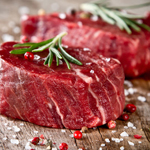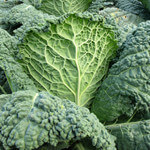Table of Contents
 The B vitamins are a group of 8 water-soluble vitamins that are found in whole, unprocessed foods. Though these vitamins – which were once thought to be a single vitamin, “vitamin B” – are chemically distinct from one another, their roles in our bodies often overlap. These roles can be summarized as: Aiding cell metabolism, maintaining brain and nerve function, producing red blood cells, and breaking down carbohydrates, fat, and protein for fuel. This article, however, contains a more detailed list of the biological functions performed by each B vitamin and the best foods from which we can obtain them.
The B vitamins are a group of 8 water-soluble vitamins that are found in whole, unprocessed foods. Though these vitamins – which were once thought to be a single vitamin, “vitamin B” – are chemically distinct from one another, their roles in our bodies often overlap. These roles can be summarized as: Aiding cell metabolism, maintaining brain and nerve function, producing red blood cells, and breaking down carbohydrates, fat, and protein for fuel. This article, however, contains a more detailed list of the biological functions performed by each B vitamin and the best foods from which we can obtain them.
Thiamine (Vitamin B1)
Thiamine is named vitamin B1 because it was the first B vitamin to be discovered. It is nicknamed the “anti-stress” vitamin because it helps to strengthen our immune systems and improve our bodies’ abilities to withstand stressful situations. Additionally, it helps our bodies form adenosine triphosphate (ATP), a nucleotide that is a major source of energy for cellular reactions.
Deficiencies in thiamine are uncommon, and are usually restricted to alcoholics and people suffering from anorexia and Crohn’s disease. Good sources of thiamine include seeds, nuts, brewer’s yeast, blackstrap molasses, kale, potatoes, liver, and eggs.
Riboflavin (Vitamin B2)
Riboflavin is an antioxidant that helps our bodies to fight free radicals, which are rogue atoms or atomic groups that contribute towards degenerative diseases and accelerate the aging process. Riboflavin also helps us facilitate cell growth, produce red blood cells, and transform vitamin B6 and vitamin B9 into usable forms.
Like thiamine, deficiencies in riboflavin are rare and mostly limited to those with poor diets. Good sources of riboflavin include almonds, organ meats, raw milk, yogurt, Brussels sprouts, and spinach.
Niacin (Vitamin B3)
Like all the B vitamins, niacin plays a role in converting carbohydrates, fat, and alcohol into energy. However, it also helps us manufacture various sex and stress-related hormones in our adrenal glands, boost our circulation, and maintain our skin health.
Niacin is the only B vitamin that is stable in heat, meaning that little of it is lost during the cooking process. Consequently, most of us will have no problem receiving enough of it through diet. That said, especially good sources of niacin include meat, fish, nuts, mushrooms, and most protein-rich foods.
Pantothenic Acid (Vitamin B5)
Pantothenic acid helps our bodies to manufacture red blood cells and steroid hormones. It also helps us utilize other B vitamins (notably riboflavin) and maintain a healthy digestive tract. Moreover, we need pantothenic acid to synthesize cholesterol. In fact, a derivative of pantothenic acid, pantethine, is currently being studied for its cholesterol-lowering benefits.
The name “pantothenic acid” originates from the Greek word “pantos,” which means “everywhere.” And that’s where you will find pantothenic acid: in almost all whole foods. Therefore, unless your diet consists almost exclusively of canned and refined foods, you’re unlikely to suffer from a deficiency.
Pyridoxine (Vitamin B6)
Pyridoxine, which is better-known as vitamin B6, helps our bodies make neurotransmitters – chemicals that carry signals from one cell to another. It is needed to maintain brain development and function, and to make the mood-regulating hormones norepinephrine, serotonin, and melatonin. Moreover, vitamin B6 helps us regulate the levels of homocysteine in our blood, and also aids our absorption rate of vitamin B12.
Though serious deficiencies in vitamin B6 are rare, mild deficiencies can affect children and the elderly. If you’re suffering from nervousness, muscle weakness, irritability, short-term memory loss, and poor concentration, consider eating more foods rich in vitamin B6 like salmon, tuna, cheese, lentils, spinach, carrots, brown rice, sunflower seeds, and chicken.
Biotin (Vitamin B7)
Biotin, also called vitamin H, is necessary for the production of fatty acids, metabolic reactions involving the transfer of carbon dioxide, and regulating blood sugar levels. It also plays a crucial role in cell growth and the metabolism of amino acids.
Deficiencies in biotin are uncommon because our intestinal bacteria produce it in excess of our body’s daily requirements. This is why most countries do not prescribe a recommended daily intake of it.
Folic Acid (Vitamin B9)
Folic acid (as well as “folate,” its naturally-occurring form found in whole foods) is one of the best-known, and most widely-studied, B vitamins. Our bodies need it to synthesize and repair DNA, form red blood cells, and facilitate cell division and growth. For this reason, it is important that infants and pregnant women get enough folic acid in their diets.
The name “folic acid” derives from the Latin word “folium,” which means “leaf” – giving us a big clue as to which foods are richest in it. Yes, leafy green vegetables like kale, spinach, broccoli, cabbage, iceberg lettuce, and collards are the greatest sources of folic acid, though you can also find it in seeds, poulty, liver, eggs, and citrus fruits.
Cobalamin (Vitamin B12)
Vitamin B12, which is only found in animal products, is an especially important vitamin for maintaining healthy nerve cells. In fact, it is directly responsible for producing and maintaining the myelin that surrounds them. B12 also has a close relationship with folic acid, and both vitamins depend on each other to perform their wider roles in our bodies. Moreover, B12 is one of the few dietary sources of cobalt, which aids our cardiovascular health.
Though deficiencies in vitamin B12 are not an issue for most people, those who avoid animal products – such as vegans – are at risk. For this reason, it’s important that these groups add a vitamin B12 supplement to their diet. Nutritional yeast, for example, is an excellent B vitamin complex (a food containing all eight B vitamins), and is suitable for vegans.






